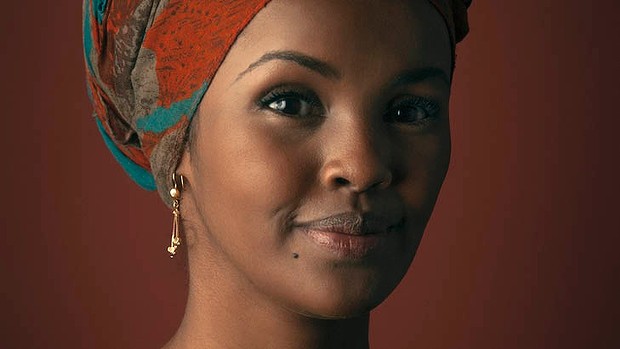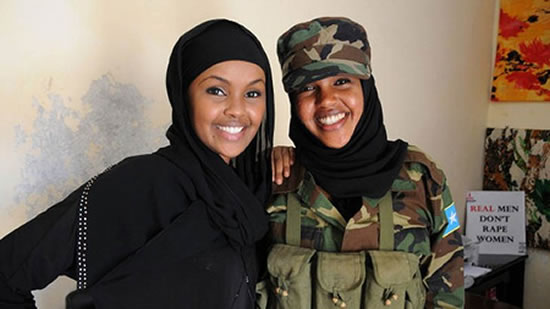
Join peace and human rights activist Ilwad Elman. Photo: Muse

By Ruby Hamad
Wednesday, March 26, 2014
At just 19, Ilwad Elman left Canada for her parents' homeland of Somalia. The now-24-year-old had only intended to visit her mother, the well-known humanitarian activist Fartun Adan. But, inspired by Fartun's work with the Elman Peace and Human Rights Centre (EPHRC), Ilwad decided to stay.
The recent history of Somalia is a bloody one; ravaged by civil war in the early 1990s, and then rocked by radical group Al-Shabab last decade. The last few years, however, have been a period of intense reconstruction.
With such changes afoot, it's not as surprising as it first seems that a self-described "Canadian girl" would want to promote human rights in Somalia. As well as her mother's work, Ilwad has her father's legacy to continue. Elman Ali Ahmed was a much-loved peace activist who rehabilitated child soldiers, setting up small businesses across the country to employ them and others affected by war. Sadly, Elman's dedication to non-violence cost him his life; he was shot to death in 1996. Soon after, her mother relocated to Canada with Ilwad and her two sisters.

Sisters Ilwad, 23 and 21-year-old Iman Elman pose inside the Elman Peace Center, a rape crisis shelter. The organisation was started by their father, who was slain by warlords in 1996. Photo: Michelle Shephard
In 2007 Fartun moved back, drawn by the need to help her people. As well EPHRC, Fartun set up Sister Somalia, Mogadishu's first rape crisis centre, encouraging survivors to seek justice in a culture that downplays rape and gender-based violence. The centre also provides business grants and education to help women become self-sufficient, with the goal that these women will go on to empower others, changing the culture from the inside.
Advertisement
I spoke by phone to Ilwad, who will be appearing at Sydney's All About Women festival on Sunday.
RUBY HAMAD: Your talk at All About Women is called 'How To Change The World.' This is something many people have tried and it is obviously not an easy task. So…how do we change the world?
ILWAD ELMAN: Changing the world is a (laughs) very big topic but from my perspective, it's about targeting cross-cultural issues. The issues that are happening in Somalia right now, they are happening everywhere in the world, especially for women. The issues of gender based violence, they are global. My talk centres around how the work I'm doing in Somalia can be implemented around the world and contribute to the greater good in changing the world.
RH: You left Canada at 19 and moved permanently to Mogadishu. How does a teenage girl give up the relative comforts and peace of a western lifestyle and move to Somalia?
IE: I've always felt very connected to Somalia. When I came back to visit my mother, I fell in love with the work that she was doing, and I could understand how she could make that break from Canada, how she could leave my sisters and I for so many years to take care of ourselves. I could see the work she was doing - just going into the office for one day could actually change somebody's life, and that's how it all evolved and I haven't left since.
RH: Somalia is described as one of the worst places to be a woman, and that is something that you are actively working at changing. Could you tell me a little about your work with Sister Somalia?
IE: We established Sister Somalia because we found there were no services available for (victims of) sexual gender-based violence in Mogadishu. So we set up life-saving interventions for survivors, which focus predominantly on health, counselling, and free housing. And as we started, we found that there was an outpouring of women and girls who needed this service.
And we started a dialogue and advocacy with the government, and advocacy internationally to raise awareness of the human suffering in Somalia, especially as it pertains to women.
Sister Somalia has (since) expanded to three different regions in two and a half years. This has been possible because we've become centred to our principle of inspiring and empowering survivors of violence. Every time we move to a new location, our new centres are sustained by women who have themselves overcome violence. So former victims are now victors of change, and they have become ambassadors for justice.
RH: You said once, 'Things are changing so rapidly in Somalia. It's like we're in the middle of a revolution and I feel like I'm a part of that.' What changes are you seeing?
IE: Rape and gender-based violence, or even any sort of violence against women was very taboo before; it was just not spoken about. And we've been very vocal about the work that we do … and three years later, rape is on the social and political agenda. It's pretty much accepted by the community that rape is something that happens in Somalia. And also, the perspectives of women themselves (have changed). Before, so many of the women we helped, they didn't want justice. They just wanted to get the health services, and they wanted to be quiet about this because that is how they were raised. But what we have been seeing in the last couple of years is women who want to speak out, women who are angry, women who want justice. This has created a momentum of women speaking out and coming together and creating that awareness.
RH: So it's very much about overcoming a culture of silence?
IE: Definitely. I think we are at a pivotal point right now in Somalia. The times are changing.
RH: I know you often talk about overcoming cultural stigma and traditions, do you feel Islam is part of that or do you think religion is a way that you can empower women?
IE: I think Islam has a huge role to play in overcoming the barriers that women face. We actually work directly with a lot of prominent religious leaders in Mogadishu … that are very much entrusted with the religion as it is from the Koran. And they talk about how men should treat women well and the role of women, and they include these in the Friday prayers and this is very important because we have an audience that we can't reach directly.
No matter how much advocacy we do, no matter how much outreach work that we do in the community, we don't have the same weight as a prominent religious elder. In an Islamic country, you have to also look at the issue of gender-based violence from an Islamic perspective and to have support from the religious leaders.
RH: Last year, I interviewed Aayan Hirsi Ali, who is also from Somalia, before her event at All About Women. She obviously has a very different perspective to you.
IE: Yes.
RH: She thinks part of the problem originates within Islam. So I was very interested to see whether you thought you could work within Islam to find change.
IE: Definitely. We work with religious leaders who talk about women's empowerment. And this isn't only for the work we do with the survivors of sexual gender-based violence. We work with child soldiers as well, children that have been radicalised by members of the terrorist group Al-Shabab. We work very closely with religious leaders to give them the correct interpretation of the Koran.
RH: Before I let you go, I wanted to talk with you a little bit about your father's legacy because it did all start with your father and the work he did with your mother. He had that very famous slogan, 'Put down the gun. Pick up the pen.' How are you continuing your father's - and mother's - legacy in that respect?
IE: Actually, yesterday (March 9th) was the 18th anniversary of his passing, and there were so many people who remember the day that he died, and people who still cry when they think of him. And the reason why is because he injected the notion of social responsibility - of doing something for your community - in a time where there was absolute chaos.
He was a social innovator … he promoted human rights, he promoted education, all these things he did independently, and I think that was incredibly unique at the time. And he inspires me every day. The work that I do is really affected by my father and my mother. She made major sacrifices herself, she came back during arguably the worst time. My mother is someone that I very much look up to and both my parents inspire me. And I hope to be able to carry that torch that they passed down.
RH: Is this a lifelong journey for you? Is Somalia where you'll stay?
IE: When I first came to Somalia, I didn't anticipate diving into this work but I have because I think I have found my purpose. I genuinely feel a commitment, and an obligation and responsibility to continue. I enjoy it as well so for the foreseeable future, I don't see myself leaving Somalia. It's hard to say at a young age what I'm going to be doing for the rest of my life, but this is what inspires me.